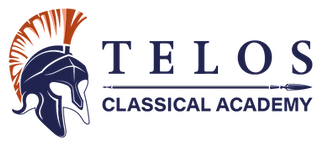Core Beliefs
Katherine TEXT HERE

Core Beliefs
Classical Education
Our philosophy of education is built upon classical education which began in Greece over 2500 years ago with the teachings of Socrates, Plato, and Aristotle. Its purpose is greater than passing on knowledge and culture in that it uses the Great Books and the masters of art and music from our Greco-Roman and Judeo-Christian heritage to introduce students to the good, the true and the beautiful around them. It requires students to be well-read and have a thorough understanding of history, as well as what it means to be a good person. Our Founding Fathers were schooled in classical education and they drew heavily upon their knowledge of Roman and Greek civilization and philosophy when drafting the Declaration of Independence and the Constitution. It is a back to basics education steeped in wisdom and virtue that provides a student with the greatest of all tools: a logical mind.
Christian Education
Telos Classical Academy is a Christian school. This means that students study the Bible, and have monthly assembly and daily prayer. We recognize and acknowledge the integral role that Christianity, the Bible, and Judeo-Christian ethics played in the founding of our country and believe that it is not possible to study Western Civilization without studying the Christian faith. Our teachers and staff strive to model Christian virtue in their work as they seek to love and support our scholars. The Nicene Creed is our Statement of Faith. We do not subscribe to any particular denomination and students and families are not required to sign a Statement of Faith to attend.
Challenging and Joyful Curriculum
School should prepare children for life—it shouldn’t dominate their life. School should teach students how to learn and to value and love learning. Learning can be a joyful endeavor when students believe what they’re learning is relevant to their life, and when it’s valued by themselves and others. Children revel in knowing something useful, or knowing something that someone else doesn’t know. A child is very happy to show off his or her knowledge about something. A challenging curriculum that is challenging yet relevant becomes joyful when a child feels accomplished about what they’ve learned. If the curriculum is too easy, it misses this mark entirely because the child realizes that they are being praised for minimal work, and they soon understand that their work doesn’t have intrinsic value and they become bored.
Telos Classical Academy follows a Charlotte Mason style education in that we believe children are born whole persons, not blank slates or empty buckets to be filled. A child has an immense desire to discover and learn about the world around him and we can keep that desire alive if we feed it properly. We also believe that education is the science of relations and that subject matter can and should relate to each other as much as possible. While we still have separate subjects of learning—we integrate knowledge across subjects as much as possible.
Virtue, Habits, and Character
Growing in virtue means forming a new habit and continuing that habit over time. Students will study and deliberate on the virtues and vices of the characters and historical figures they read about in literature, history, and theology. The Telos curriculum focuses on the four classical cardinal virtues of prudence, justice, fortitude, and temperance and three additional theological virtues: piety, charity, and service. Students will have opportunities to learn about and discuss how our choices every day either improve or decline our character and virtue.
Our faculty will train our students in these habits, expecting the proper conduct of students at all times, from their interactions with one another to their interactions with teachers and parents. Students will learn to govern their thoughts, their emotions, their actions, and their impulses.
Excellence and Mastery
In a society which accepts mediocrity as the standard, Telos expects students to strive for excellence in everything they do. Excellence should become a habit, and faculty and staff expect students to practice this habit daily in their academics, in their relationships, and in their deeds. Our aim is that this habit encompasses every area of their lives.
Students should put their best effort into their work. We do not accept work that is sloppy or poor in quality, or that is below what the student is capable of. Students have an opportunity to redo work that can be done better, so they understand that something that is worth doing is worth doing well.
Small Community
Relationships and mentoring happen best in a small community. Our small class sizes ensure that students receive individual attention from teachers, allowing faculty to learn the strengths and weaknesses of students, to give immediate and personal feedback, and to know how best to challenge and inspire students to achieve their full potential. We hope to establish the same tight community between parents and faculty/staff.
Multum Non Multa: Much Not Many
We believe in quality over quantity and that students should drink deeply from the springs of our culture. Multum non multa is a Latin phrase meaning much not many. Our students will engage in deep and thoughtful reading and writing; throughout the course of the year, students will learn less surface details and more depth about what they study.
